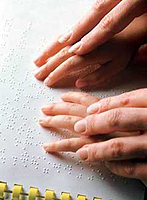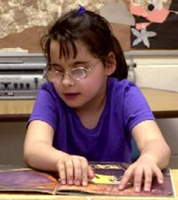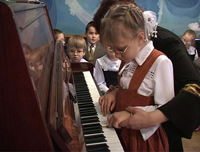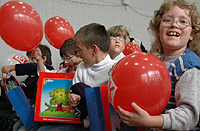What if you were born blind baby? How to develop a blind child and give it household skills? Answers to these questions you will find in the article.
Content
Children's blindness
In the family was born blind kid… Awareness of this fact - the strongest stress for his loved ones. Similar experiences are usually aggravated by the alarm for the future of the child: how this defect will affect mental and physical health? Can the baby normally develop, learn, communicate with other people? The answer to all these questions largely depends on how strong and patient parents will be, who will have a hard test - adapt the blind child to normal, full-fledged life.
Unfortunately, only some diseases of the organ of vision (for example, hyperopia, myopia) are quite successfully cured. As for congenital diseases of the visual analyzer - for example, partial atrophy of the optic nerve (partial defeat of the visual nerves, on which there are signals from the eye to the visual centers of the cerebral cortex), especially in deep children, - that pathologies are practically not amenable to treatment and dramatically limit Child's visual capabilities.
Until the two or three months of life, a baby with deep violations of vision by the nature of the reactions and behavior is almost no different from the greater child of the same age. And only after this period the pathology begins to notice himself. The kids are lagging behind the peers in the development of mobility skills (there are in mind turns from the back on the stomach and back, attempts to sit down, and in the future and on their own), they have a slower thinking, it is difficult to try to masse the subject actions.
In addition, the decline in visual functions adversely affects mental, physical and emotional development, which is expressed in low mobility, reduced mood, closetness trends, «Immersion in yourself» And, as a result, it leads to ignoring contacts with other children.
Development of a blind child
Many parents of blind and visually impaired children seeking to solve the problem with the help of medicine, misses the need to pay more attention to the physical, mental, musical and intellectual development of their kids. I should not forget that, first of all, the child needs maternal love, her attention, as well as in understanding his problems and endless patience from loved ones.

Nature awarded a person, in addition to visual, and other sensations: auditory, olfactory, proprioceptive (emanating from muscles and tendons), tangible. All this allows a baby to one degree or another to compensate for the shortage of information about the world environment associated with the lack of view. Parents are obliged to help him, creating an adequate environment, allowing to develop sense authorities.
From the very birth of such a baby, it is recommended to wear in the slider and a free sprawling, it is unacceptable to swaded it.
To stimulate tactile sensations (sensations from touches, feeling) It is necessary to put the child on the tissue surfaces with various textures. It can be silk, cotton, velvet, velvet, tulle and other fabrics. Previously baby is recommended to split - it will be better to feel the surface of the skin. Making the movements available to him on a particular surface, the baby receives an idea of the surrounding space, it has awareness of how items moved, as their relationships and position in space change, the ability to understand the relationship between causes and consequences. Useful to make a special blanket for kid, stitched from flap fabrics with different texture. At the edges, it is advisable to sew rings, buttons, balls from rattles, ropes, bubrentes and t.NS. Put a baby on the blanket so that it is in different positions - on the stomach, on the back or on the side.
If the baby has residual vision, then pieces of fabric, located next to each other, should have not only tactile contrast (quite sharply different in the texture), but also visual (for example, one black and velvety, other - white and silk). In addition, it is necessary to conduct classes aimed at the formation of visual attention. It is necessary to start as soon as possible, since it is in the first months of life a visual system undergoes considerable changes and is the most sensitive to external incentives - light and color. To draw the attention of a child with deep violations of vision, it is advisable to use the most bright items. The most successful of these are flashlight (lamp, fluorescent toys), shiny items, pictures and objects with contrast pattern, enlarged images. If the combinations of contrast and movement are not enough, you can try to attract the attention of the baby to the subject of any sound: a voice, a rattle melody, tapping on the subject.
Build emotional contact. From birth, the child is very sensitive to the impact of an adult who cares for him. Most significant for baby touch and affection. At the same time, motion mom should be calm and leisurely. Sharp, inaccurate, insecure gestures of an adult lead a baby into a state of discomfort and anxiety, he can become restless and fissile. The baby still does not understand words, but already feels the tone of the voice, the tempo of speech. Therefore, during feeding, as well as disguised baby or dealing with it, you need to talk gently with the child. Do not allow the baby too long to scream. And, of course, immediately feel good to respond to all the child's attempts to communicate, although they can only be reduced to the fact that he motionlessly listens, makes indefinite movements, makes some sounds.
We develop the vestibular apparatus. Little blind children without special sessions move little, so their vestibular apparatus develops slowly. And this, in turn, inhibits the development of active movements. To compensate for this lag, the baby must be taken as often as possible and move with him everywhere. Best do it during walks. The child must be in a special backpack («kangaroo»). Wearing a crumb on hands or in a backpack is desirable and when performing light household houses. After all, moving together with mom, the baby makes passive movements that contribute to the development of his vestibular apparatus. In addition, they provide good body contact between mom and baby, and it is so necessary to a blind child!
Similar joint movements must be made every day, at least until the weight of the baby allows mom to wear it.
 Acquaintance with the outside world. At the blind child, for obvious reasons, it does not arise to raise and hold the head, stretch your hands to toys and surrounding objects, feel them, crawl, or walk, examining the surrounding space. Therefore, the desire for knowledge of the world from such a baby should develop parents.
Acquaintance with the outside world. At the blind child, for obvious reasons, it does not arise to raise and hold the head, stretch your hands to toys and surrounding objects, feel them, crawl, or walk, examining the surrounding space. Therefore, the desire for knowledge of the world from such a baby should develop parents.
Searching behavior and games with mom is the initial, but extremely necessary stage on the way from early social affection (parents, households) for further social adaptation of the child in kindergarten, school and.T.D. To achieve this goal, it is necessary to encourage any attacks of the baby to move and independence (always under the supervision of adults), since its personal, real experience brings much more benefit than any verbal descriptions. And the wiring to the surrounding world will be other senses.
Touching plays a huge role in the process of dating a blind baby with surrounding objects. Hands replace blind vision, with their help he gets an idea of certain objects. Training a blind child touching, you need to encourage his desire to use your hands to examine various items and materials. At the same time, parents, of course, should understand that the kid himself will not be interested in many things until he tells him - after all, he simply sees them! Showing the child something, adults must control his hands, putting their own on them, and at the same time tell what color it is what his form is for what it serves and how to use it. You need to teach the baby to examine the items systematically using both hands (one hand, for example, keeps the dishes, and the other finds the toy on the table and puts it in the dishes).
Naturally, the crumb need to warn about the danger, if he is going to touch something hot or very cold. Otherwise, frightened unexpected sensations, the child will be afraid to use his hands for «Viewing» ambient world.
Teaching the baby to some kind of movement, should be behind the baby's back and do it all with him. If at the same time be opposite, the movement will turn out to be mirror, and the child will be difficult to perceive it. In addition, adults must constantly tell the blind baby about what they are doing at the moment, what happens around. Thus, they form the prerequisites for the establishment of a meaningful speech contact with a child.
Hearing. Hearing images of the objective world enable kids with deep violations to respond to stimuli, correlate them with objects and in accordance with this organize their behavior. Talking with the child, you need to call it by name, explain who speaks with him. And be sure to warn before any unexpected manifestation. For example, before touching the kid with hand. Otherwise, he may be unpleasant or it is scared.
Using the possibilities of auditory perception, a blind child can be trained with grazing movements. In order to grab the sounding item, this kid needs to spend acoustically to localize its goal. True, with the help of hearing, he cannot control the trajectory of the movement of hands towards this purpose. Blind children before adapting the position of the brushes of their hands to the size and form of the subject, must first explore it tactile (to the touch). But in the end, the child must understand that one or another subject exists, although it cannot be fascinated, and it does not make sounds. Parents need to teach the baby to determine the rumor, where the toy fell, or find the disappeared items to the touch. For this, the child needs to provide the opportunity to find it out of his things that fell to the floor, suggesting, where they are. If something in the house is rearranged to another place, it is necessary to inform the child.
Another point to pay attention to: Call different directions in space and the location of items should be as specifically as possible. Such concepts as «there», «long away», «here», Baby does not perceive. Determining the sizes of the object for the blind child, proceed from the sizes of the kid's body. For example, «This is the same size as your hand».
The formation of auditory perception, together with the motivation of the baby to dialogue, communication, ensures the activity of the child's speech activity. And this is further becoming the most important factor of partial compensation of blindness
 Music will also help. The importance of musical images in the upbringing of a blind child, and especially their influence on the development of brain functions, it is difficult to overestimate. Therefore, from the very beginning, parents should encourage the blind kid to vocals and music. Already in the infant for the baby should be arranged for a short (5-15 minutes) daily «Sessions», Unobtrusively entitled it to rhythmic needles with a beautiful melody. At the same time, you can slightly rock the crumb on your hands or help him bounce (and preferably, intonate - tuning). Important, however, so that after such musical «Five minutes» The child remained not in silence and isolation, but in the atmosphere of natural household sounds - the voices of the mother, her steps around the apartment, shouts of children on the street, the noise of trams or boiling on the kettle plate and. T. NS., Adapting to the world around him.
Music will also help. The importance of musical images in the upbringing of a blind child, and especially their influence on the development of brain functions, it is difficult to overestimate. Therefore, from the very beginning, parents should encourage the blind kid to vocals and music. Already in the infant for the baby should be arranged for a short (5-15 minutes) daily «Sessions», Unobtrusively entitled it to rhythmic needles with a beautiful melody. At the same time, you can slightly rock the crumb on your hands or help him bounce (and preferably, intonate - tuning). Important, however, so that after such musical «Five minutes» The child remained not in silence and isolation, but in the atmosphere of natural household sounds - the voices of the mother, her steps around the apartment, shouts of children on the street, the noise of trams or boiling on the kettle plate and. T. NS., Adapting to the world around him.
It is important that the child constantly participated in the daily family classes. This will help him get an idea of how, when and how these or other events occur, and later he will reproduce them in their games, gradually absorbing certain household skills. At the same time, adults should allow the baby to act independently, creating a safe environment for him and ensuring good control. Things in the house should be kept on strictly defined places that the child should know about. Then it will be possible to allow them to independently assemble them in the apartment and return to its place. Of course, the kid is unlikely to be able to manage to cope with orders right away. But adults must praise him for any manifestation of independence. And all the flaws can be adjusted later.
The development of independence from adults also contributes to the practice, by virtue of which the child should be in the family «Your task», its age and development stage. It increases the self-esteem of the kid, he has a desire to cope with more complex tasks. Naturally, before providing a certain independence to the blind child, parents must provide him with safe and comfortable conditions in the house - make electrical appliances, medicines, open windows, windows, and balcony, high temperature and T. NS. But the most important thing is to promote the formation of the crumbs of the prediction of personal danger. This feeling is useful to the child and later when it comes to go beyond the limits of his home.
Attention - physical development. The lag of a blind or visually impaired child in motion development affects its gaming activities. For such children, primitive monotonous repetitions with objects can be maintained for a long time. The reason for the appearance of these obsessive movements is that the kid simply does not know how to take himself with something more interesting. However, this manifestation of monotony and limitations can be prevented if you involve a child in an interesting game.
Exercise, as you know, play an important role in the formation of the right physique and the development of the motor sphere. Therefore, a child with deep violations of violation has been needed from the first week of life. Health gymnastics is needed. The set of exercises is based on children's physiology and anatomy on the basis of the age physical and intellectual possibilities of such a child.
The blind kids of the nursery are recommended gymnastics in a game form, consisting of exercises that are aimed at the development of the vestibular apparatus, muscle system and tactile sensitivity. A child can perform them with mom or with an educator. It is very useful to conduct classes under the quiet, rhythmic music, synchronizing the movement in the tact with it. For the development of muscles of brushes and fingerstands (small motors), you can use everyday situations (when the child is buttoned buttons, examines a new toy and t.D.).
Self-service skills. The ability to serve yourself without assistance - the main thing that you need to learn the blind baby. This is the first and most important step towards a full adaptation in society. And parents should pay special attention to this aspect.
The main reception on which training is based - to control the hands of a child to put on them. And, making together with the baby, this or that action, adult must definitely tell the baby that, what and how he does. However, even the most prospective and patient parents will not be able to teach a child with absolutely everything. The kid should receive a wide variety of impressions and skills, communicating with moisture peers. These relationships contribute to its natural adaptation, help the formation of purposefulness and education of independence.
We go out into the world with a smile. So, the kid has learned and learned a lot, thanks to the help of loved ones. It's time to expand life space, getting fresh impressions of the world, open up new opportunities for communication. But how to determine what time has come? Peculiar «Dough» The willingness to social contact with other people becomes… Smile baby. And the most effective incentive for it is a friendly human voice. Gradually, the smile and laughter of a blind child become more selective, with their help he expresses his increasing attachment to his beloved and loving people.

Socialization includes the development of emotional connections, communication with the surrounding people. And naturally, the blind kid must learn to establish these ties. This will help him to adapt to kindergarten faster (sometimes it can only be about a specialized children's preschool institution), and at school (in most cases specialized). Successes in training and good relationships with peers will help the child such important personal qualities as a self-esteem, the desire to recognize among feasures and relatives, the need for self-expression. How to help your child achieve all this? Most importantly, what should understand the blind child and his parents, - the fact that the baby will have to live in a world adapted for greater people. For a walk in the park, in the courtyard, in the circus and the children's theater, it will be forced to communicate, mainly with normally seeing children, which, of course, will be an increased interest in it. Surely they will regret such a child, and sometimes in not very delicate form. Yes, and not quite tactful questions about blindness and its reasons, here, unfortunately, inevitable.
In such cases, parents need to react calmly and with dignity. The best way out is to answer everything, keeping an excerpt, diplomatic, without constraint and excessive drama, and at the right moment to translate the conversation to another topic and involve in her discussion of the blind kid. Thus, a close blind child, and he himself will soon learn enough to talk freely on any, including those and unpleasant themes. And this ability is very useful to the blind child in life. The experience of maintaining a relaxing, suspended dialogue with unfamiliar peers and foreign people will make it feel not only of their diverse interests and moral atmosphere, but will also help develop signs that the conversation proceeds in a benevolent tone and that there is no reason for anything, or Or fear. And maybe teach «anticipate» interpersonal conflict from which no one is insured.
A meaningful conversation of a blind child and mom at an early age, Mom's conversation in his presence with acquaintances and outsiders and, finally, the ability of a child to conduct a dialogue - these are the main components of the conditions for its successful learning games, self-service, initial literacy at home, and finally Braille letters because almost all the problems of initial training and education of a blind child depend on its communicability. If there is no dialogue between the student (baby) and the teacher (mom), then at this stage of its development, training is extremely difficult or impossible. And, on the contrary, the teaching of the blind child is the most difficult skills, concepts and subjects (music certificate, theory of music, mathematics) Even unfamiliar teachers will significantly simplify if they, together with their parents, teach the baby to competently ask questions - so as to receive exhaustive, in his opinion, Answers, detailed instructions, clear instructions and reasonable recommendations.
Kindergarten, school, work for a blind child
Blind and visually impaired children can attend special pre-school institutions, where certain pedagogical techniques are provided for them. Supporters spend special classes with them - for example, they organize dynamic games and exercises to music and singing, which simultaneously develop rumors, speech, touch, vestibular apparatus, coordination of muscles, legs and backs, and also contribute to the development of shallow motility (for example, waving from plasticine). In addition, special books with volumetric (convex) letters, numbers and illustrations from the world of sculpture, architecture, sports, technicians, fauna and flora, as well as talking toys are intended for kids with deep pathologies of vision.
Of course, progress in learning may not be so obvious as I would like. Especially if we are talking about a blind deep child, in which the neurophysiological functions of the central nervous system (first of all, the brain) do not fully correspond to its age. But even in this case, efforts will not be in vain and will be rewarded later. There is always reason to hope that with age the situation more or less normalizes.
Teenagers who have successfully completed boarding schools for blind and visually impaired (with a high level of intelligent test), can complete the appropriate universities and become lawyers, historians, musicians, even computer programmers (on machines equipped with a braille keyboard and speech synthesizer). Also blind and visually impaired can operate in the system of educational and production enterprises of the All-Russian Society of Blind, depending on the degree of preservation of view, assemblers of electric machines and plastic products, as well as cartographs - subject to preliminary training in the workplace. In addition, the blindness also perfectly cope with the responsibilities of the secretary on the phone, massage therapist, the work of the vegetable breeding and.T.NS. In a word, people with deep lesions of vision have a lot of opportunities for full-fledged socialization. The main thing is not to lower your hands and not give up to death, no matter how threatening it seemed.









